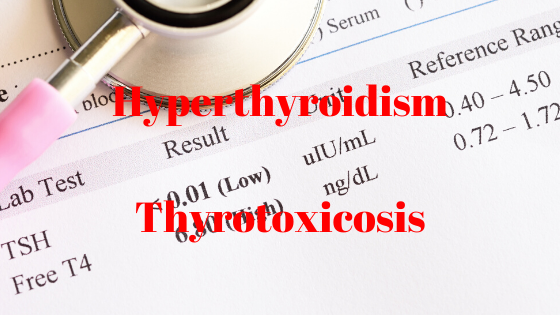What is thyroid gland?
The thyroid gland is a butterfly-shaped gland located in the middle of your neck. The thyroid gland produces two major hormones: thyroxine (T4) and triiodothyronine (T3). T4 is produced in a more abundant quantity. Both hormones play an essential role in regulating and balancing body metabolism.
What is hyperthyroidism/thyrotoxicosis/overactive thyroid?
Hyperthyroidism or thyrotoxicosis, in simple terms, is also called overactive thyroid. It occurs when the thyroid gland makes too much thyroid hormone. The increased amount of thyroid hormones in the blood increases body metabolism, causing different symptoms.
What are the symptoms of hyperthyroidism/thyrotoxicosis/overactive thyroid?
A person with an overactive thyroid may complain of the following symptoms:
- Tiredness
- Anxiety
- Difficulty in sleeping
- Shaking or increased tremors
- Palpitation
- Sweating
- Feeling warm or unable to tolerate hot weather
- Loose stool or increased frequency of motion
- Loss of weight
- Increased appetite
- In females, period irregularities
- In male, erectile dysfunction or breast enlargement
Symptoms can be present in any combination. That is, not all symptoms can be present in a person with an overactive thyroid. Some people may not even suffer or feel any symptoms.
If overactive thyroid is not treated, then a person can suffer heart rhythm problems called atrial fibrillation. AF increases the risk of stroke. In severe cases, a person can suffer heart failure. An untreated overactive thyroid can also weaken the bone leading to osteoporosis.
What are the causes of hyperthyroidism/thyrotoxicosis/overactive thyroid?
An autoimmune condition called Graves disease is the most common cause of overactive thyroid. In this condition, the body produces antibodies against the thyroid gland. These antibodies stimulate the thyroid gland to produce excess thyroid hormones.
Another common cause of an overactive thyroid is swellings or nodules within the thyroid. These nodules can over-produce the thyroid hormone. These nodules are not cancerous and are benign. The problem can be caused by either multiple nodules (toxic multinodular goiter) or a single nodule (Toxic nodule). Toxic means overactive.
How is hyperthyroidism diagnosed?
Blood tests usually diagnose overactive thyroid. Your doctor will perform a thyroid function test. In overactive thyroid, T4 and/or T3 levels will be high. However, the thyroid-stimulating hormone (TSH) will be low.
Your doctor will also consider doing antibody tests. Common antibodies measured are the TPO antibody and the TSH receptor antibody. Your doctor can undertake additional scans like ultrasound or nuclear medicine scans to find the cause of overactive thyroid.

